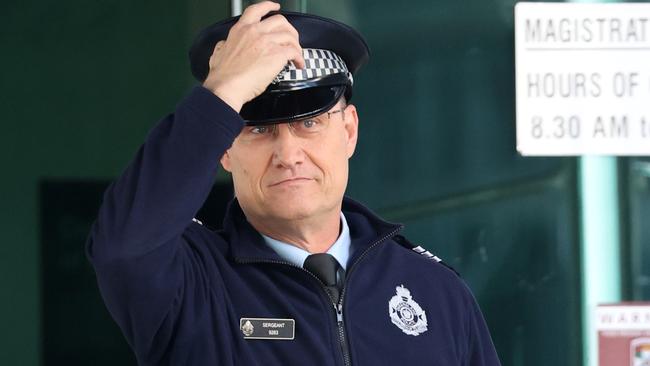Commission of inquiry hears evidence of culture of neglect in police response to DV
Police officers are going to great lengths to avoid domestic violence jobs, including lying and turning away victims, a commission of inquiry has heard.
Police & Courts
Don't miss out on the headlines from Police & Courts. Followed categories will be added to My News.
Current and former police officers have told a commission of inquiry about colleagues going to great lengths to avoid domestic violence jobs, including ignoring taskings, turning women away at the counter and even lying about the severity of a complaint to their superiors.
The Commission of Inquiry into Police Responses to Domestic and Family Violence was yesterday told about field training officers “minimising” domestic violence to young impressionable constables and even crews who “intercept” someone in a different direction to avoid attending a call.
Sergeant Paul Trinder, a Brisbane-based shift supervisor with nearly 30 years experience, told the inquiry he’d had an officer downplay a domestic violence incident in order to “finalise a job” and go home.
“I have been caught before where I’ve had a first responder minimise information to me … only to find out later that that victim had been failed by that officer when there was clear evidence that she had been assaulted,” he said.
“The respondent had threatened to decapitate the family dog in front of her and her children.
There was clear photographic evidence that she had been assaulted, (a) punch size bruise around her rib cage and so on. That information was not provided to me at the time.”

Sgt Trinder said on another occasion, a complaint came through to the station via Policelink, involving a breach of a domestic violence order.
He said the complaint was given to a particular officer to investigate but two months later, when the officer was transferring to another station, it was discovered he had not even opened the tasking.
“I took it on myself,” he said.
“The first thing I did is ring the aggrieved … and apologise to her. I asked her if she would like to make a complaint against the officer.”
In another incident, Sgt Trinder said police failed a woman who came to the station by appointment to make a complaint of domestic violence.
Sgt Trinder said that when the woman and her friend arrived, the officer at the counter asked who the appointment was with, and when they could not provide a name, said he could not help them.
“They were unable to provide that information because they just didn’t know – but it was a female officer – so the counter officer has said, well, there’s no female officers working at the moment … so I can’t take your complaint (and) … basically sent her away,” he said.
“These are the people that it’s our job to support, protect and listen to these people and if they’re turned away by the organisation charged with their protection, where do they go then?”
But he said the majority of police did their best under difficult circumstances when it came to responding to domestic violence.
“I want to qualify that by saying these are in the minority in terms of the overall work that our first responders do,” he said.
“Overall we do a very good job in very difficult circumstances. However, we are let down by these individuals on occasions for one reason or another. And that’s unfortunate but it’s the reality of the environment.”
Former Sergeant Audra Pollard told the inquiry she tried to make a complaint of domestic violence with a victim who was known to her – but she did not identify herself as an officer.
“I went to the police … with all the evidence that I had and I was told it was not domestic violence,” Ms Pollard, who retired from the service this year, said.
“I was ever so politely trying to convince the senior constable … that I had a lot of evidence to share with him.
“He continued to make excuses as to why it was not domestic violence.
“My husband is also a police sergeant in prosecutions, we were in complete disbelief over what we were hearing.”
With a background as a communications co-ordinator she said when a caller became known as a “regular”, they received less support from police regardless of their reason and they were spoken about in a derogatory way.
“Oh that f-wit has called again, that spoon is on the line again, don’t bother sending a crew to that job she’s just blowing hot air, that sort of thing.”
Ms Pollard said she was aware of crews creating “diversionary tasks” when given DV jobs, such as intercepting people “in a completely different direction to where the actual call for service is”.


